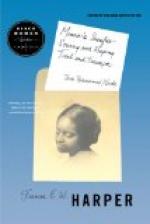“Whose life, mama?”
“The life of Annette’s [grand]mother. We were girls together and I loved her dearly,” Mrs. Lasette replied as tears gathered in her eyes when she recalled one of the saddest memories of her life.
“Do tell me all about it, for I am full of curiosity.”
“My child, I want this story to be more than food for your curiosity; I want it to be a lesson and a warning to you. Annette’s grandmother was left to struggle as breadwinner for a half dozen children when her husband died. Then there were not as many openings for colored girls as there are now. Our chief resource was the field of domestic service, and circumstances compelled Annette’s mother to live out, as we called it. In those days we did not look down upon a girl and try to ostracize her from our social life if she was forced to be a servant. If she was poor and respectable we valued her for what she was rather than for what she possessed. Of course we girls liked to dress nicely, but fine clothes was not the chief passport to our society, and yet I think on the whole that our social life would compare favorably with yours in good character, if not in intellectual attainments. Our dear old mothers were generally ignorant of books, but they did try to teach good manners and good behavior; but I do not think they saw the danger around the paths of the inexperienced with the same clearness of vision we now do. Mrs. Harcourt had unbounded confidence in her children, and as my mother thought, gave her girls too much rein in their own hands. Our mother was more strict with her daughters and when we saw Mrs. Harcourt’s daughters having what we considered such good times, I used to say, ’O, I wish mother wasn’t so particular!’ Other girls could go unattended to excursions, moonlight drives and parties of pleasure, but we never went to any such pleasure unless we were attended by our father, brother or some trusted friend of the family. We were young and foolish then and used to chafe against her restrictions; but to-day, when I think of my own good and noble husband, my little bright and happy home, and my dear, loving daughter, I look back with gratitude to her thoughtful care and honor and bless her memory in her grave. Poor Lucy Harcourt was not so favored; she was pretty and attractive and had quite a number of admirers. At length she became deeply interested in a young man who came as a stranger to our city. He was a fine looking man, but there was something about him from which I instinctively shrank. My mother felt the same way and warned us to be careful how we accepted any attention from him; but poor Lucy became perfectly infatuated with him and it was rumored that they were to be shortly married. Soon after the rumor he left the city and there was a big change in Lucy’s manner. I could not tell what was the matter, but my mother forbade me associating with her, and for several months I scarcely saw her, but I could hear from others that she was sadly changed.




